by Lisa Cooke | Aug 25, 2015 | 01 What's New, Cloud Backup, Disaster Prevention, images, Inspiration, Listeners & Readers, Preservation, Publishing, Writing Family History
 It’s time (maybe past time!) to write your family history. Should you write a book or throw everything into a digital archive?
It’s time (maybe past time!) to write your family history. Should you write a book or throw everything into a digital archive?
Recently Joyce attended a genealogy conference I taught that was sponsored by the Central Arkansas Library System. She wrote to us that she went home with a newly-resolved plan for how to write her family history:
“I thoroughly enjoyed hearing you speak. I learned a lot also. There was a question asked at the conference that I had also thought a lot about: how to leave your legacy to your family. With technology changing every day, I have decided that the old-fashioned way is probably the best. Technology will not change the fact that we can sit down to a paper book. So I will keep my CDs, DVDs, and flash drives; however, I will print out books for my family to have, whether they have access to the computer or not.”
A Combination Approach
I certainly agree that paper and books are certainly a solution for genealogical information being accessible for generations to come. I like a combination approach. Since paper can deteriorate and become damaged like anything else, having a cloud back up service (I use Backblaze) and digital items like flash drives is also a good plan.
Part of leaving a legacy also involves finding ways to share that help the next generations (particularly those not interested in research) understand the value of the family tree. That’s where a Google Earth “family history tour” or other innovative sharing comes into play. If you can click click, copy, and paste, you can create an exciting multi-media story that looks like a video game that will captivate the next generation! (Learn how to create a Google Earth family history tour in my 2-volume Google Earth for Genealogy CD). The combination of sharing the info in fascinating ways and preserving the info in reliable multiple formats is a comprehensive strategy for the future!
Resources
How Cloud Backup Helped One Genealogy Gem Get Closer to Living a Paper-Free Life
Recommended File Formats for Long-Term Digital Preservation
Why I Use and Recommend Backblaze Cloud-based Computer Backup Service
 Ready to make your own plan to write your family history and preserve it digitally? Share your resolve–along with this post–with someone else! Use the handy icons at the top of the page to share on Facebook, Pinterest or your favorite social media site, or email the link to this article to a friend. Thanks!
Ready to make your own plan to write your family history and preserve it digitally? Share your resolve–along with this post–with someone else! Use the handy icons at the top of the page to share on Facebook, Pinterest or your favorite social media site, or email the link to this article to a friend. Thanks!
by Lisa Cooke | Aug 14, 2017 | 01 What's New, Court Records, Records & databases
Lydia thinks her great-grandfather was murdered–perhaps even by her grandfather! Here’s some advice for her and everyone researching “cold cases” for criminal ancestors on your family tree.
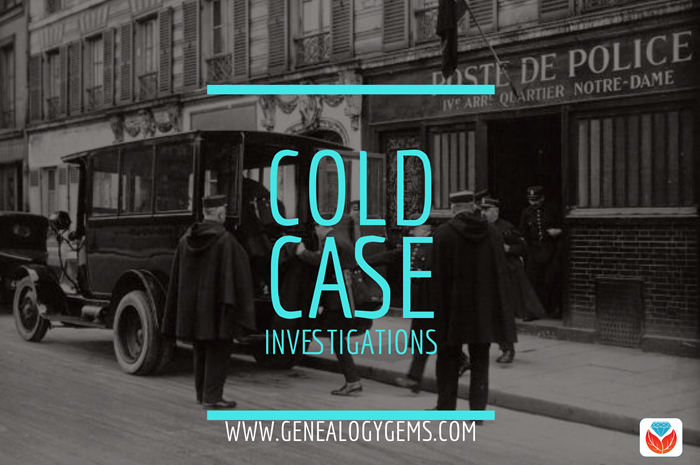
I heard recently from Lydia with these intriguing questions:
My great great grandpa William John Gabriel Nelson disappeared one day, never coming home from work. It was family lore that he had been “shanghai’d.” But even as a child the story didn’t add up. [Through a] few other mentions of the account throughout the years, and recently reconnecting with cousins through Ancestry.com/DNA and your advice to just email DNA matches, I have a growing reason to believe my great-grandfather was murdered. An even bigger fear is that my grandfather may have been the one to do it.
All parties involved with this are now dead, so follow-up is impossible with them. But I’m wondering about contacting the Los Angeles Police Department (LAPD) or the library to determine if indeed there was a cold case, missing persons report or John Doe. Since this happened in the mid 1940’s, would I contact the LAPD or is this now a job for a historian?
As a citizen, Lydia can certainly contact the LAPD here. It might take a bit of persistence to get to the right person or resource. I would start by asking for how you can find out the status of a cold case from the year in question.
Here are 4 ways to follow up on your own criminal ancestors’ cold cases:
1. Look for cold case files online.
As I often say, all good searches start online because they will help you prepare to go offline. In other words, not everything is online, but searching online first will give you a lay of the land, revealing what is available, who to contact, and where to go in person. Start with a Google search such as LAPD cold cases. The search results include several good leads:
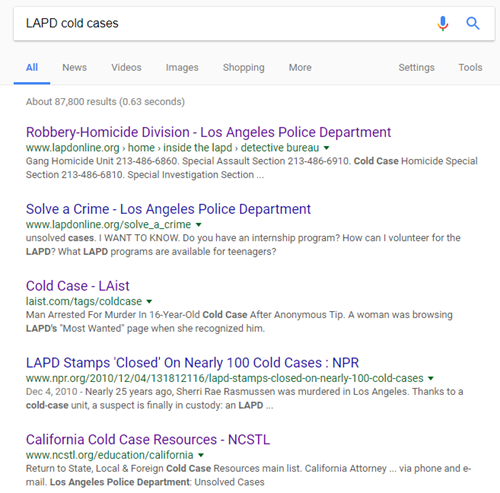
With a case like Lydia’s that is over 70 years old, I wouldn’t expect to pull it up in an online database (though you never know!) But I do see several sites here that provide phone numbers to gain access to those who can lead you in the right direction.
2. Search Google for clues.
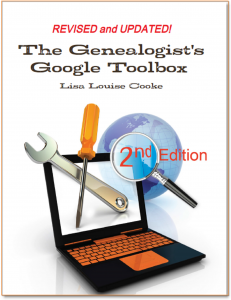 Use Google’s powerful search technology to look for online mentions of the names, places, and dates of your particular case.
Use Google’s powerful search technology to look for online mentions of the names, places, and dates of your particular case.
In Lydia’s case, she might begin with keywords relating to her great-grandfather’s disappearance, with his name, year, and the place he was last seen. Including descriptive keywords such as disappear, mystery, vanished or murder might also yield helpful results.
Learn more about effective search techniques in my book, The Genealogist’s Google Toolbox, Second Edition.
3. Check old newspapers.
Newspapers in your ancestor’s hometown (or further afield) may have mentioned the incident. With a common name like William (or Bill) Nelson, you may need to weed out the overabundance of unwanted results you get. Let me show you how I did this in
GenealogyBank, a popular genealogical newspaper website:
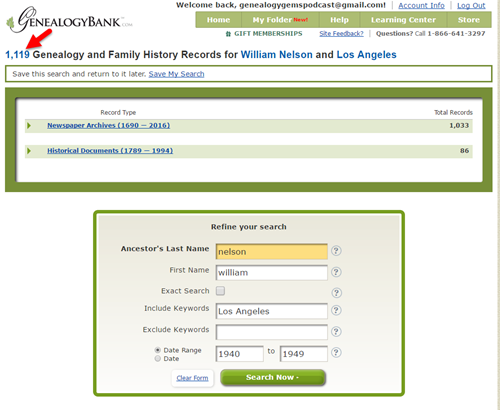
The initial results of searching GenealogyBank (above) for the terms William Nelson and Los Angeles brought up over 1,000 search results! (The red arrow points to the tally.) Since I don’t like wasting valuable research time on irrelevant results (who’s with me?!), I refined the search. I specified Nelson as a last name, William as a first name, Los Angeles as a keyword, and I added a date range: the decade during which he disappeared. Next, I limited my search to Los Angeles-area newspapers, shown below:
This search narrows results down to under 200: a robust number, but at least manageable to look through for relevant material.
I want to be able to use these same search parameters in the future, so I click
Save My Search. The search now appears in
My Folder for future reference.
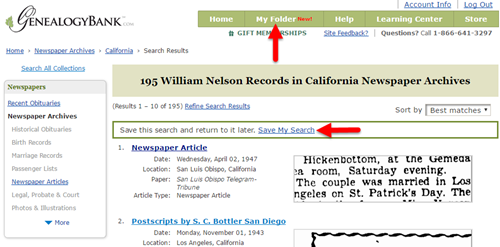
4. Look for criminal records.
 If you knew (or suspected) that a relative was prosecuted for a crime, it’s time to start looking for records relating to the criminal case. There may be several kinds:
If you knew (or suspected) that a relative was prosecuted for a crime, it’s time to start looking for records relating to the criminal case. There may be several kinds:
- In cases of suspicious death (where there was a body, unlike Lydia’s case), look for any surviving coroner’s records.
- If a trial may have occurred, research the jurisdiction to find out what court would have handled it, and then look for files relating to the case.
- If an ancestor may have served time, look for prison records. Genealogy Gems Premium podcast episode 29 is devoted to the topic of prison records.
Get inspired!
Read this article about a woman who was researching not one but two mysterious deaths on her family tree.
Want to help investigators lay to rest their own cold cases?
Click here to read about the Unclaimed Persons Project and how you can help.

by Lisa Cooke | Jul 10, 2015 | 01 What's New, Ancestry, British, Census, Church, Digital Archives, FamilySearch, Findmypast, images, Irish, Jewish, Records & databases, United States

Every Friday, we blog about new genealogy records online. Do any of the collections below relate to your family history? Please share this post with any genealogy buddies or societies that might be interested. At the end of this post is a search tip for researching records in other languages.
ARGENTINA BAPTISMS. Ancestry has updated its database of Argentina, Select Baptisms, 1645-1930 (in Spanish), which is also searchable on FamilySearch. It’s a partial but growing index; click here to see current coverage on FamilySearch. Baptismal records are generally for newborn babies, with the date and place of event, parents’ names, and newborn death information.
ENGLAND AND WALES CRIMINAL RECORDS. Nearly 2 million records have been added to Findmypast’s databases of “crime and punishment.” Datasets include England & Wales, Crime, Prisons & Punishment, 1770-1935, with details of felons in England and Wales, 1770-1935; the Home Office: Newgate Prison Calendar 1782-1853, taken from printed lists of prisoners to be tried at Newgate, in London, a prison for debtors and felons; Quarterly Returns of Prisoners 1824-1876 with 639,600 records of sworn lists of convicts held on board prison hulks, in prisons and criminal lunatic asylums; The Home Office: Criminal Entry Books 1782-1871, letters sent out from the Home Office, and a sort of “most wanted” list: the Metropolitan Police: Criminal Record Office: habitual criminals’ registers and miscellaneous papers kept by the police and circulated among the force on a regular basis.
IRELAND PARISH RECORDS. We blogged earlier this week about this new collection and it’s been a super popular post! The National Library of Ireland has posted digitized images of all its parish records, dating from the 1740s to the 1880s. Click on the blog post link to learn more about it.
KANSAS CENSUS RECORDS. Kansas, City and County Census Records, 1919-1961 is now available to Ancestry subscribers. Partially indexed, the images are of population schedules for city- and county-level enumerations. These include household, livestock and agricultural details by head of household; beginning in 1953, all household members are named.
POLAND GHETTO ID CARD REGISTRATIONS. A new FREE database on Ancestry is Poland, Łódż Ghetto ID Card Registrations, 1939-1944 (USHMM) (in German), an index to Jewish records from the United States Holocaust Memorial Museum. Records include extracts from vital records, ID cards, work registration documents and protocol forms.
 Some of the record sets mentioned above–and many others–were written in languages you might not speak. For best results, use the version of the name that would be common in that language, along with keywords in that language, before trying searches in your own language. Google Translate does translate common keywords and some common English names (John, Alexander, Mary, Andrew) to other languages, but isn’t guaranteed to show you an equivalent every time (especially if one doesn’t exist). You can also Google “name translator” plus the name of the language you wish to know; several online tools exist. And MyHeritage has advanced translation tools that do the work for you when you’re searching!
Some of the record sets mentioned above–and many others–were written in languages you might not speak. For best results, use the version of the name that would be common in that language, along with keywords in that language, before trying searches in your own language. Google Translate does translate common keywords and some common English names (John, Alexander, Mary, Andrew) to other languages, but isn’t guaranteed to show you an equivalent every time (especially if one doesn’t exist). You can also Google “name translator” plus the name of the language you wish to know; several online tools exist. And MyHeritage has advanced translation tools that do the work for you when you’re searching!
Resource:
by Lisa Cooke | May 7, 2016 | 01 What's New, Ancestry, Beginner, Brick Wall, Census, Records & databases, Research Skills
When may it pay off to look at the same records or indexes twice? When you can compare them on different genealogy websites. Here’s an example for this census research tip. 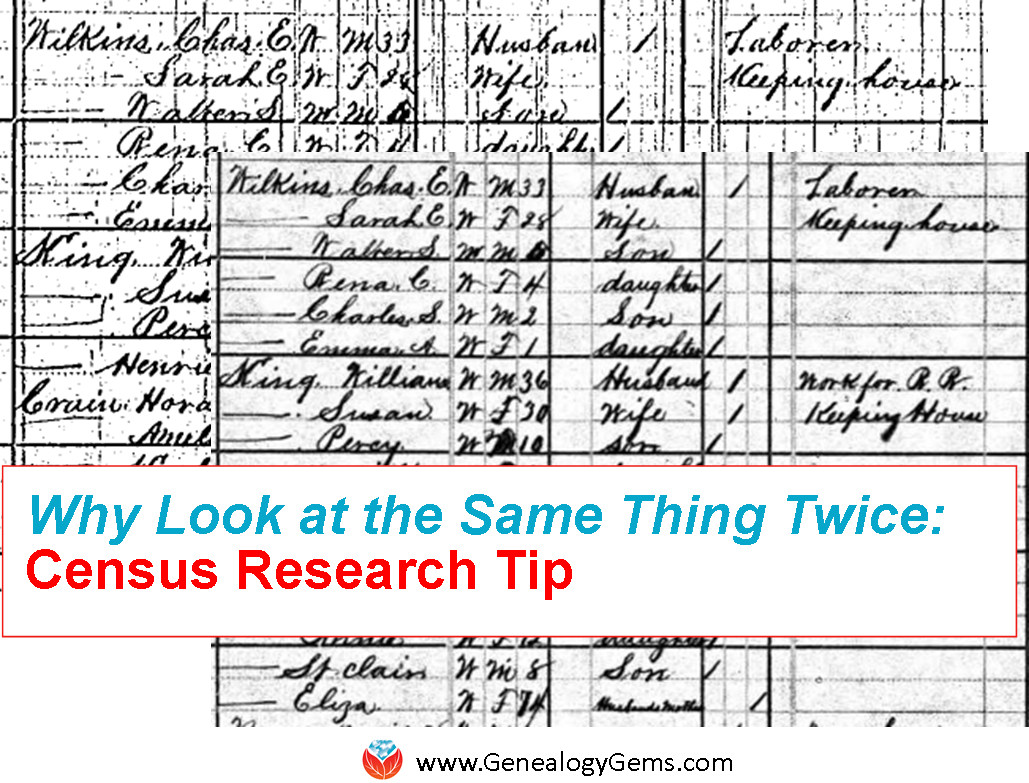
You’ve probably noticed that some record sets are available online at multiple websites. At each site, the images and indexes you find may be a little different. Online tools for viewing and searching at each site may also be different.
For example, a digitized image may be faded, dark, blurry, blotchy, cut off, or otherwise unreadable on one website but clearer on another site. Here are two images from the first few lines of the 1880 U.S. Federal Census taken in Bay Minette, Baldwin, Alabama. The first image comes from HeritageQuest Online (available at public libraries) and the second is from Ancestry.com. See the difference?
As you can see, depending on which line you’re reading, one image may be clearer than another.
Here’s another census research tip: The online tools available at each site are different, too. At HeritageQuest Online, you can view the image at original size, 200% or 400%, and you can look at the image as a negative, which sometimes helps faded text stand out a little more. Ancestry.com lets you zoom in and out, magnify specific areas, and rotate the image or view it in mirror form (in case you’re trying to read backward text bleeding through from the other side).
More Gems for Online Genealogy Research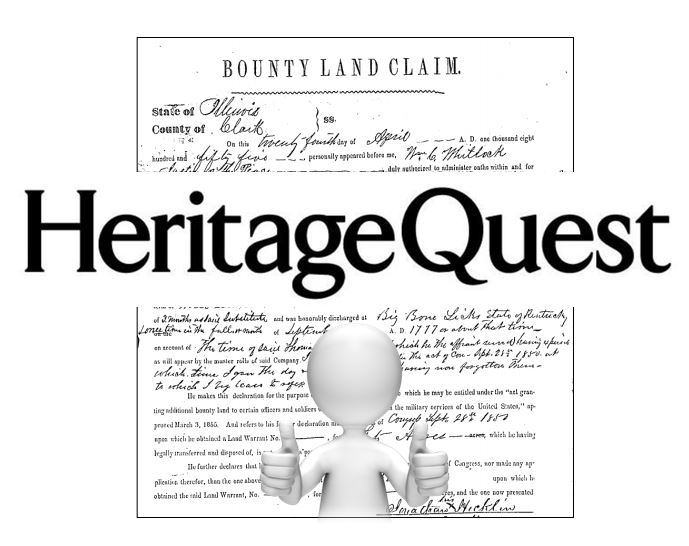
HeritageQuest Online Gets Better with Ancestry’s Support
4 Tips for Getting the Most out of Ancestry.com
Genealogy Gems Premium podcast episode 125: HeritageQuest Online, Ancestry Library edition and other great genealogy resources at the public library (Available only to Genealogy Gems Premium website members)
by Lisa Cooke | Jun 30, 2017 | 01 What's New, British, Canadian, Digital Archives, Findmypast, Newspaper, Photographs, Records & databases, Scottish Genealogy
New digital archives for genealogy host Canadian photos and history magazines, Oregon historical records, and Virginia newspapers. Also this week: Google Maps additions in Canada; Norfolk, England records; England and Wales criminal records; Scottish Presbyterian church records and Glasgow newspapers; and criminal records from England/Wales.
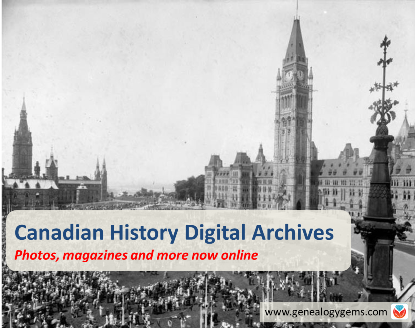
Canada: History Magazines in Digital Archive
Canada’s History Society has launched a new, mobile-responsive digital archive. Canada’s History launches with the entire run of a unique magazine: The Beaver, which explored the history of the Far North from fur-trade colonial days to modern times. “In addition to The Beaver, the archive will feature issues of Canada’s History magazine as well as Kayak: Canada’s History Magazine for Kids,” says a news article. The project was partnered by the Hudson’s Bay Company History Foundation. Its website is also worth exploring if your family history reaches into that part of the world.
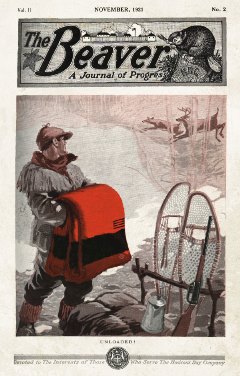
Image courtesy Canada’s History Society.
Canada: Photo Archive
More than 100,000 digitized photos represent the beginning of a new Canada photo archive available to subscribers of The Globe and Mail, which is celebrating its 173rd birthday this year along with the country’s 150th. According to a news article, photo topics “range from a 1901 picture of the Forester’s Arch being erected on Bay and Richmond streets for a royal visit to a Canadian astronomical discovery in the late 1990s. You can search the archive by date or Globe photographer, and there are special collections that cover different aspects of Canadian life.”
England: Norfolk Records
Subscription website Findmypast.com has added to these collections of genealogical records on Norfolk, England (see a Findmypast special offer at the bottom of this post):
- Norfolk Marriage Bonds, 1557-1915. “Browse 444 volumes of marriage bonds from four ecclesiastical courts: the Archdeaconry of Norfolk Court, the Archdeaconry of Norwich Court, the Dean & Chapter of Norwich, and the Diocese of Norwich Consistory Court.”
- Norfolk Non-Conformist Church Records, 1613-1901. Browse “11 registers covering various denominations including Methodist, Quaker, and Baptist in the parishes of Attleborough, Aylsham, Kenninghall, Norwich, Tasburgh, Walsingham, and Wymondham.”
- Norfolk Poor Law Union Records, 1796-1900. Browse “55 volumes covering 20 unions across Norfolk to discover whether your ancestors fell on hard times. Explore 10 different types of records, ranging from baptism and report books to relief lists and court orders.”
England and Wales: Criminal Records
Findmypast.com has finished adding a final installment to its Crimes, Prison and Punishment Collection. About 68,000 records were added that may help you “uncover ordinary and extraordinary stories of criminals, victims and law enforcers from Georgian highway robbers to Victorian murderers, Edwardian thieves, and a whole host of colorful characters in between!”
Scotland: Glasgow Newspapers
The British Newspaper Archive has added the following to its collection of Glasgow newspapers:
- Glasgow Evening Citizen: added the years 1879-1892, so the current collection now tops 20,000 pages and covers 1866-1890.
- Glasgow Evening Post: added the years 1881-1890. The total collection of over 14,000 pages and covers 1867-1890.
Scotland: Presbyterian Church Records
More than 36,000 Presbyterian church records, covering 1744 to 1855, have been added to ScotlandsPeople, a website maintained by the National Records of Scotland. “The 20,255 births and baptisms (1744–1855), 10,368 marriages and proclamations (1729–1855) and 5,422 death and burial records (1783–1855) may be especially helpful for anyone searching for a person who was born or baptized, married, or died before the introduction of statutory registration in 1855,” states an article on the site.
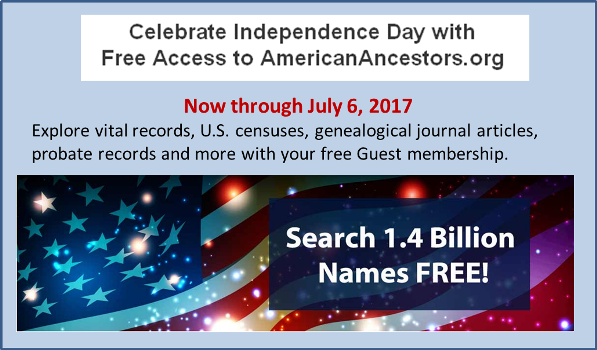 United States: Oregon Digital Archive
United States: Oregon Digital Archive
The Oregon Historical Society has just launched OHS Digital Collections, a new resource for researching Oregonians on your family tree. “This new website allows online public access to a rich variety of materials from the OHS Research Library, including items from the manuscript, photograph, film and oral history collections,” states a Hillsboro Tribune article. More content is planned for this new site, so check back periodically.
United States: Virginia Newspapers
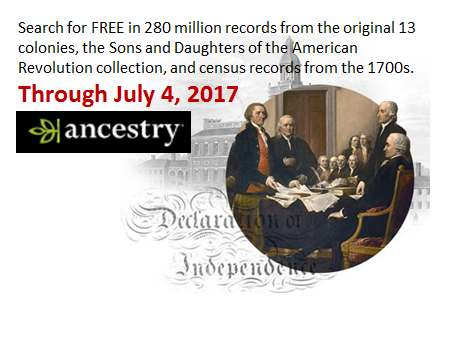 The Virginia Newspaper Project is putting the Library of Virginia’s collection of Civilian Conservation Corps (CCC) newspapers on Virginia Chronicle, a free digital newspaper archive with nearly a million pages. According to an announcement, “The camp newspapers in the LVA’s collection, published from 1934 to 1941 by the young men of the CCC, were mostly distributed in camps throughout the Commonwealth, though a handful are from locales outside Virginia….[The camp newspapers] offer a vivid picture of camp life during the Depression…[and] are also packed with the names of people who were active in the CCC–you might find a mention of one of your relatives among the pages. Click here to learn more about the CCC and the newspapers they produced.”
The Virginia Newspaper Project is putting the Library of Virginia’s collection of Civilian Conservation Corps (CCC) newspapers on Virginia Chronicle, a free digital newspaper archive with nearly a million pages. According to an announcement, “The camp newspapers in the LVA’s collection, published from 1934 to 1941 by the young men of the CCC, were mostly distributed in camps throughout the Commonwealth, though a handful are from locales outside Virginia….[The camp newspapers] offer a vivid picture of camp life during the Depression…[and] are also packed with the names of people who were active in the CCC–you might find a mention of one of your relatives among the pages. Click here to learn more about the CCC and the newspapers they produced.”
 Special offer: Through July 2, 2017, get your first month of Findmypast.com World Subscription for just $1.00! In addition to unparalleled record content for England, Scotland, Ireland and Wales, Findmypast has added tons of great content to its US and Canada collections.
Special offer: Through July 2, 2017, get your first month of Findmypast.com World Subscription for just $1.00! In addition to unparalleled record content for England, Scotland, Ireland and Wales, Findmypast has added tons of great content to its US and Canada collections.
Bonus! Get an exclusive subscriber-only webinar, 20 Unmissable Resources for Tracing Your British and Irish Ancestors, when you sign up!
Full disclosure: This post contains affiliate links and Genealogy Gems will be compensated if you make a purchase after clicking on these links. Thank you for supporting Genealogy Gems!
 It’s time (maybe past time!) to write your family history. Should you write a book or throw everything into a digital archive?
It’s time (maybe past time!) to write your family history. Should you write a book or throw everything into a digital archive? Ready to make your own plan to write your family history and preserve it digitally? Share your resolve–along with this post–with someone else! Use the handy icons at the top of the page to share on Facebook, Pinterest or your favorite social media site, or email the link to this article to a friend. Thanks!
Ready to make your own plan to write your family history and preserve it digitally? Share your resolve–along with this post–with someone else! Use the handy icons at the top of the page to share on Facebook, Pinterest or your favorite social media site, or email the link to this article to a friend. Thanks!




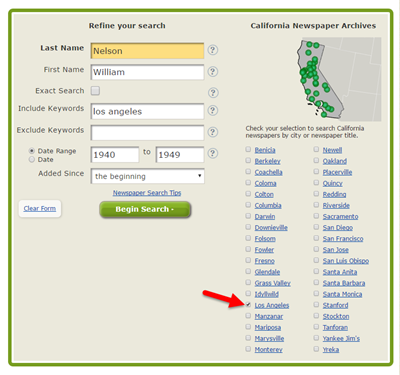











 Special offer: Through July 2, 2017, get your first month of Findmypast.com World Subscription for just $1.00! In addition to unparalleled record content for England, Scotland, Ireland and Wales, Findmypast has added tons of great content to its US and Canada collections.
Special offer: Through July 2, 2017, get your first month of Findmypast.com World Subscription for just $1.00! In addition to unparalleled record content for England, Scotland, Ireland and Wales, Findmypast has added tons of great content to its US and Canada collections.